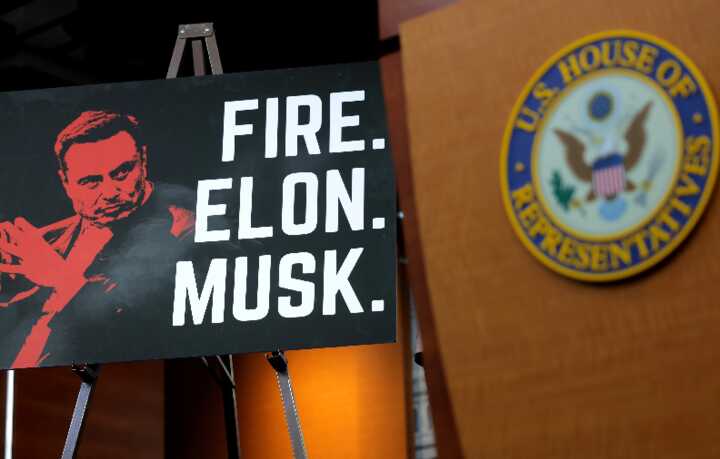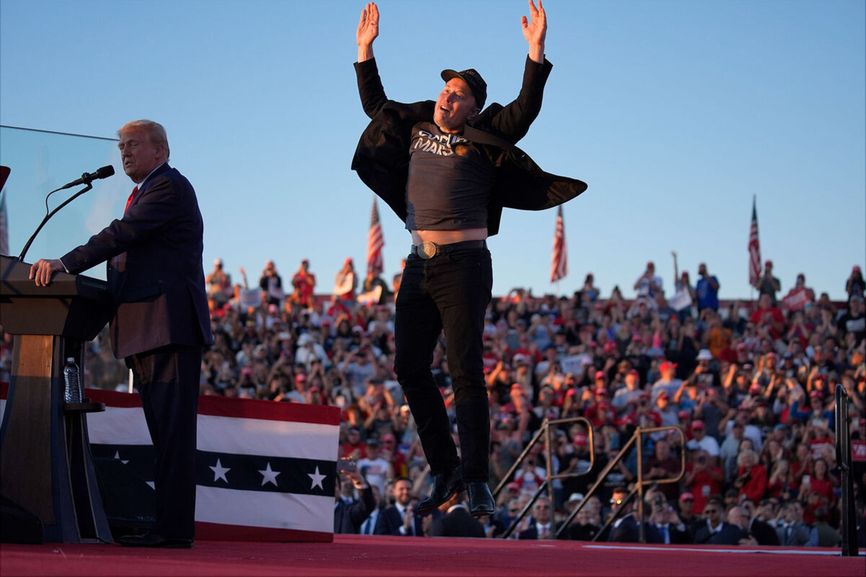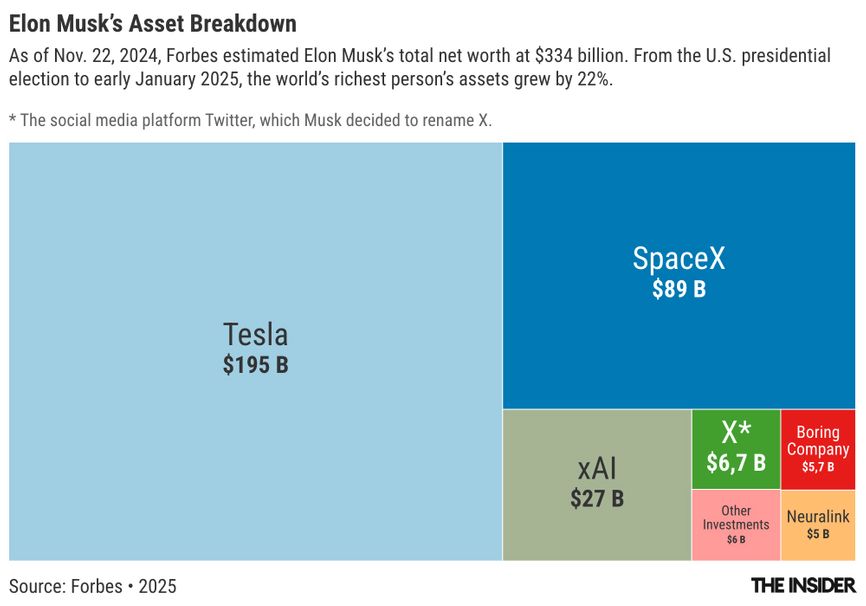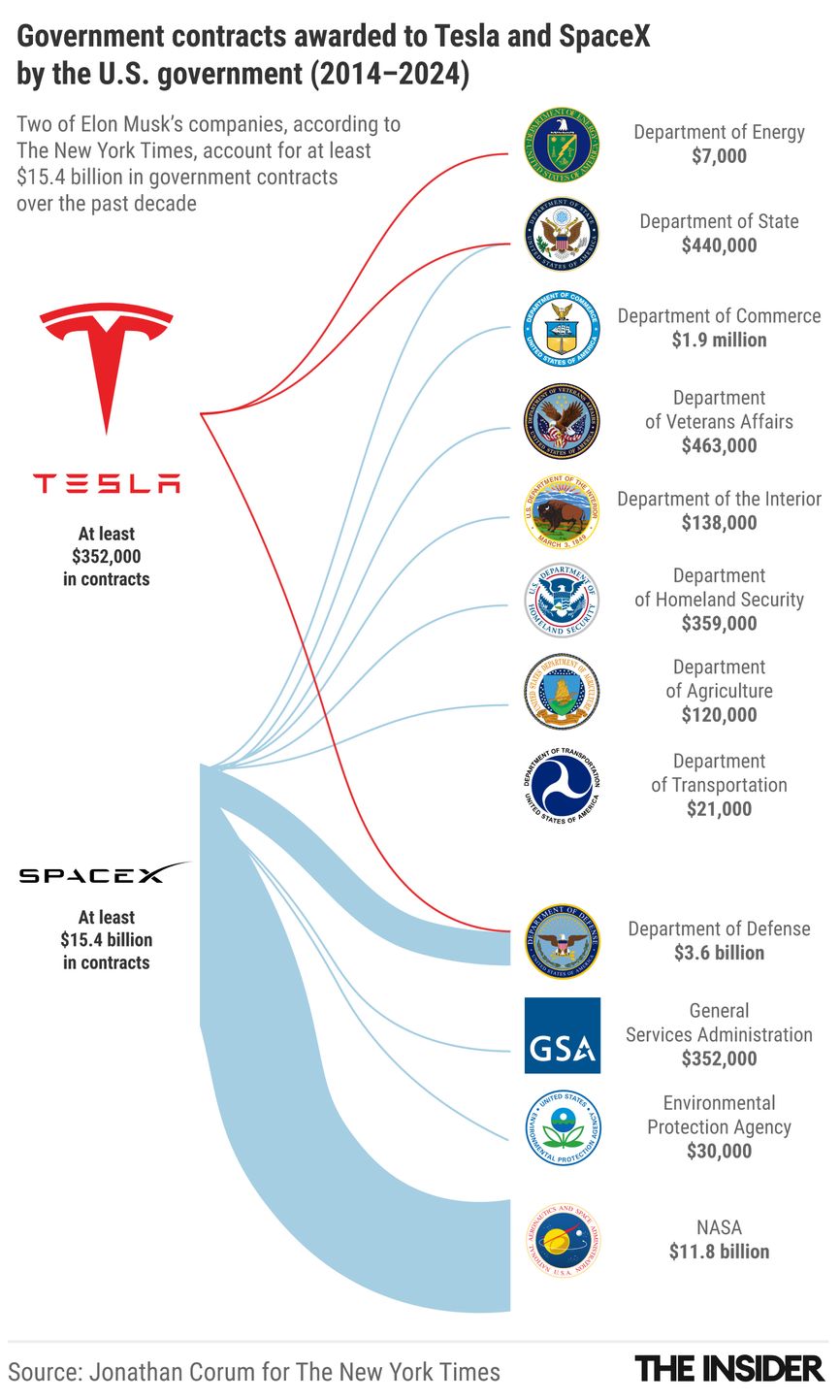
As soon as Donald Trump took office, Elon Musk effectively became the second most powerful figure in the White House.
While he holds no official constitutional authority, he is already exerting significant influence over both domestic and foreign policy, reported by The Insider.
His team of 20-something engineers, who lack any experience in government administration, have dubbed themselves the Department of Government Efficiency — “DOGE” — and now enjoy access to classified financial data from U.S. government agencies. Meanwhile, Musk has made a series of controversial foreign policy statements, including expressions of support for far-right movements in Germany and the UK.
With his growing access to the levers of power, Musk is becoming a classic oligarch: his fortune has been largely built on government contracts, and his ability to shape labor laws — laws that his companies have repeatedly violated — will remove the last barriers to his business ambitions. Additionally, insider information and direct access to decision-making processes will allow him to manipulate the stock market more effectively, further expanding his already massive wealth.
Love to hate you: How Musk ended up on Trump’s team
“Trump might be one of the world’s best bullshitters ever. Like my dad. Bullshitting can sometimes baffle the brain. If you just think of Trump as sort of a con-man performance, then his behavior sort of makes sense,” Elon Musk told his biographer Walter Isaacson.
Musk likely made this remark to Isaacson in 2022, after Trump called him “another bull***t artist” amid reports that Musk was considering buying Twitter. But just over a year later, the Silicon Valley billionaire became one of the driving forces behind the real estate salesman’s presidential campaign. Trump has reciprocated the support, dedicating a significant portion of his victory speech to Musk.

The two men first met after the 2016 presidential election. In that contest, Musk had supported Hillary Clinton, and he had backed Barack Obama before that. The Tesla CEO had spoken publicly about Trump in a mostly negative light, suggesting that he wasn’t a leader who aligned with America’s best interests.
Until recently, Musk had financially supported Democratic presidential candidates
Musk’s initial in-person meeting with Trump did little to change his view of the man. First, Trump told Musk that although his friends had gifted him a Tesla, he didn’t actually drive it. Second, Trump repeatedly expressed his desire to “get NASA going again,” while Musk advocated for investments in Mars exploration and increased competition in the space industry. “He seems kind of nuts, but he may turn out okay,” Musk said after the meeting.
Musk’s disappointment with Trump seemed to reach its peak a year later when the U.S. withdrew from the Paris Climate Agreement. In response, Musk resigned from the president’s advisory council. But it didn’t take long for the disappointment to give way to a new sympathy. By the end of 2021, Elon Musk, who had previously appeared uninterested in politics and held moderately centrist views, began to pay more attention to how power is exercised.
Isaacson recounts an incident in August 2021 in which Musk was snubbed by the White House, which did not extend him an invitation to an event celebrating progress in the field of electric vehicles. Shortly afterward, President Joe Biden publicly praised GM CEO Mary Barra for making the U.S. a leader in EV technology — this despite Tesla’s record-breaking sales far outpacing those of GM. Musk took Biden’s remarks as a personal insult.
By early 2022, Musk had become deeply concerned with “woke culture” fuming that, “The woke mind virus is mostly concentrated in the Democratic Party, even though most Democrats don’t actually support these ideals.” This ideological frustration was one of the reasons he began buying Twitter shares in 2022, according to Isaacson’s biography.
Musk was particularly angered by the platform’s decision to ban Trump’s account, along with those of other radical political figures in the U.S. When Musk took control of Twitter, he positioned himself as a champion of free speech and a defender of democracy.
However, his political evolution accelerated dramatically after he met comedian and podcaster Joe Rogan and psychologist Jordan Peterson at a Tesla Giga Texas factory party. This ideological shift was noted by both Grimes, the mother of two of his children, and his ex-wife, Justine Wilson. Both were surprised by Musk’s newfound fascination with far-right conspiracy theories. Isaacson recounts how, when Musk started sending Grimes right-wing memes and conspiracy theories, she responded: “Is this from 4chan or something? You’re actually starting to sound like someone from the far right.”
“Is this from 4chan or something? You’re actually starting to sound like someone from the far right,” Musk’s then-girlfriend Grimes texted him
Musk’s transformation only gained momentum. Less than two years after that fateful party, he had become an outspoken Trump loyalist. In 2022, he had suggested that Trump should “hang up his hat and sail into the sunset,” claiming the former president was politically obsolete. By January 2024, however, Musk was openly questioning the legitimacy of the U.S. electoral system. He warned his followers that migrants would soon “come for their homes” and argued that hiring non-white pilots (“DEI hiring”) posed a threat to flight safety.
The Economist analyzed Musk’s social media posts over the past decade and found that, since 2022, his discussions on immigration, crime, and regulation had surged exponentially, while his posts about space exploration and energy issues remained nearly unchanged. In the past two years, roughly one in seven of Musk’s posts has been political in nature. Musk himself claims he simply “pried open the Overton window.”
For Musk, control over Twitter — now rebranded as X — has become more of a political mission than a financial investment. He sees himself as leading a crusade against a culture he describes as “communism rebranded” and “a death cult.”
It’s possible that this same ideological drive led Musk to become one of the largest financial backers of Trump’s 2024 presidential campaign and the Republican Party as a whole. Between July 3 and October 15, 2024, Musk personally donated $133 million to Republican political campaigns, making him the third-largest individual political donor in the U.S. in the 2024 election cycle.
Musk and government contracts
By supporting Trump, Musk was likely considering his interests in government contracts, which have greatly contributed to his wealth. Forbes lists Musk as the world’s richest person, estimating his net worth at $406.7 billion as of Feb. 6, 2025. His key ventures today include SpaceX (spacecraft launches and Starlink satellites), Tesla (electric and autonomous vehicles), and Twitter, which he has rebranded as X. Among these, SpaceX is the only company Musk founded himself and is possibly his most successful one — but its true financial standing is difficult to assess since privately held companies are not required to disclose financial reports.

SpaceX has relied heavily on government funding. In its first ten years, the company received around $1 billion in investments, with every second dollar coming from public funds. According to Payload Research, in 2023–2024 more than a third of SpaceX’s total revenue came from contracts with NASA and the Pentagon. A significant portion of its earnings also comes from Starlink satellite internet subscriptions.

The New York Times calculated that in 2024 alone, Musk’s companies secured around 100 government contracts worth a total of $3 billion. Over the past decade, SpaceX and Tesla have collectively received at least $15.4 billion in government contracts, with most of the funds coming from NASA and the U.S. Department of Defense.

At the same time, in the last two years, at least 20 investigations have been launched into Musk’s companies, as per The New York Times. These include inquiries into Tesla’s vehicle safety, environmental damage caused by SpaceX, labor rights violations, stock manipulation, and investor fraud.
What’s the matter with Tesla?
Tesla insurance rates are typically higher than those for other cars. One reason is that repair costs are extremely high due to the use of specialized components, making even minor fixes expensive. Another issue is Tesla’s elevated risk of accidents. In November 2024, the used car marketplace iSeeCars published a ranking of the most dangerous vehicles on the road in the U.S. today. Two Tesla models made it into the top 23 cars most frequently involved in accidents.
However, the biggest concerns revolve around Tesla’s Autopilot. At the start of 2023, 363,000 Tesla vehicles were recalled due to safety risks. A study by the U.S. National Highway Traffic Safety Administration (NHTSA) found that the self-driving feature “posed an unreasonable risk…due to insufficient driver adherence to safe driving practices.”
Since 2023, Tesla has also been subject to a probe into steering system defects — over 2,300 drivers have reported that their steering wheels locked up or stopped working completely on certain Tesla models. A Reuters investigation revealed that since 2016, Tesla has received tens of thousands of complaints about steering-related defects. The investigation also confirmed the existence of a secret internal team at Tesla whose mission was to discourage Tesla owners from filing complaints or taking their cars to service centers — effectively reducing the number of officially reported complaints.
Labor rights and worker safety
Another major issue surrounding Musk is his treatment of workers. The National Labor Relations Board (NLRB) sued Musk over a tweet in which he suggested that Tesla factory workers would lose stock options if they unionized. The court ruled the statement was an illegal threat, but in October 2024, an appeals court overturned the decision, citing Musk’s right to “freedom of expression.”
When SpaceX was accused of illegally firing engineers who criticized Musk for fostering a sexist workplace environment, the company’s legal team joined forces with Amazon’s — a company infamous for its harsh labor policies. Together, they filed a lawsuit challenging the constitutionality of the NLRB itself.
Journalists at Reuters investigated workplace safety at SpaceX facilities by analyzing the company’s own reports to U.S. regulators. Their findings revealed that incident rates at SpaceX were nearly 10 times higher than the industry average. Reuters also uncovered hundreds of unreported worker injuries that SpaceX had failed to disclose.
The number of safety incidents at SpaceX that the company has reported to regulators is nearly 10 times the industry average
In 2023, the U.S. Department of Justice (DOJ) sued SpaceX for discriminating against refugees in its hiring practices. Musk claimed the company was restricted from hiring immigrants due to government regulations on the aerospace industry. The case ultimately fell apart, and SpaceX won in court.
Musk’s Boring Company, which specializes in tunnel construction, was found to be committing multiple safety violations, as were Tesla’s factories, which were fined for breaches of workplace safety. The Equal Employment Opportunity Commission (EEOC) also sued Tesla for harassing employees who reported racial discrimination at work.
“When I started this case, I suggested that the conduct would stop if Elon Musk would make a statement and a commitment to his employees that this is not tolerated. We haven’t heard that after seven years of litigation, a nine-figure verdict then a seven-figure verdict. Why isn’t he stopping this conduct? That’s what doesn’t make sense to me,” attorney Lawrence Organ, who represented one of the affected Tesla workers, said in an interview with CNBC.
After Musk acquired Twitter, he carried out mass layoffs without explanation. Several thousand former employees, including top executives, sued X Corp. — and Musk personally — for unpaid wages and severance amounting to hundreds of millions of dollars. These cases are still ongoing.
Stock manipulation
The U.S. Securities and Exchange Commission (SEC) has been investigating Musk’s acquisition of Twitter (now X) since 2022. Before buying the platform, Musk was a major minority shareholder. He first disclosed his stake in early April 2022, despite being legally required to do so by Mar. 24. He repeatedly ignored SEC subpoenas, forcing the regulator to take him to court to obtain testimony. The Twitter acquisition investigation remains open.
This is not Musk’s first major clash with the SEC. His previous legal battle over misleading tweets about Tesla ended with Musk paying $40 million in fines, stepping down as Tesla’s chairman, and agreeing to have his business-related social media posts pre-approved by lawyers.
Despite this, Musk later admitted that Tesla could never go private — a key point in the initial SEC case. In 2023, he was partially acquitted in a lawsuit filed by Tesla investors who claimed his tweets caused them financial losses. “He was partially vindicated in 2023 when he won a case against a group of shareholders who claimed they lost money based on his tweet. A jury unanimously decided that he was not liable for their losses. His hot-shot lawyer Alex Spiro argued to the jury, ‘Elon Musk is just an impulsive kid with a terrible Twitter habit.’ It was an effective defense strategy that had the added virtue of being true,” wrote Walter Isaacson, Musk’s biographer.
“Elon Musk is just an impulsive kid with a terrible Twitter habit,” argued the billionaire’s lawyer Alex Spiro
Another stock-related controversy involving Musk dates back to 2016, when Tesla’s board approved the buyout of SolarCity, a company Musk co-founded. In 2023, Musk successfully argued in court that he had not pressured Tesla’s board into approving the deal, even though analysts had pointed out that the acquisition was financially burdensome for Tesla.
By mid-2024, a U.S. fraud investigation into Tesla’s self-driving technology came to light. The DOJ questioned the legality of statements made by Tesla and Musk himself suggesting that Tesla vehicles were fully autonomous. Under U.S. law, manufacturers of self-driving cars are required to warn drivers that they must remain attentive at all times and be ready to take control. Tesla does provide such warnings, but U.S. authorities argue that Musk’s public statements undermine this guidance. If the DOJ can prove this, Musk and Tesla could face fraud charges for misleading investors about the company’s product capabilities — or even defrauding Tesla customers.
This was not the only lawsuit against Musk’s companies in 2024.
Now, with Musk’s new position in the U.S. political system — one that gives him direct access to Treasury payment data — he has unprecedented opportunities to manipulate the market. It is the kind of influence he could only dream of having before.
Musk at the helm
The long list of scandals involving Elon Musk and his companies paints a clear picture of his complex relationship with government regulators, his dependence on state contracts, and, ultimately, his desire to sit as close as possible to the Oval Office. Just like at Trump’s Mar-a-Lago estate, where Musk has been a frequent visitor of late, he now enjoys direct access to the U.S. president, sitting in on phone calls with foreign leaders and lobbying for government funding for his next business venture.
In an administration where the president often makes unilateral decisions based on impulse, having direct access is precisely what transforms a wealthy businessman with political ambitions into an oligarch.
This was the warning Joe Biden issued in his farewell speech, cautioning Americans about a rising oligarchy in the U.S., where the wealthiest individuals could end up in direct control of government power. On the eve of Trump’s inauguration, U.S. media speculated that the billionaire would be given an office in the West Wing. However, this idea was shot down by Trump’s chief of staff, Susie Wiles, a key figure in his reelection campaign. The administration’s “ice maiden” is credited with playing a major role behind the scenes to convince Trump to run for a second term.
While Musk didn’t get an office in the White House, he relocated to Mar-a-Lago, moving into a house next door to Trump’s, where the two have been virtually inseparable since the election. Formally, Musk holds the title of “special government employee” — a position without a salary (which he doesn’t need anyway) but one that grants him official access to classified information.
Under his control, a newly created government body was established: the Department of Government Efficiency (DOGE). Its staff consists entirely of Musk’s handpicked engineers, aged 19 to 25, who come in with zero experience in public administration. Critics have already dubbed the group the “Hitler Youth.” From the outset, the DOGE team has acted aggressively. The department’s official mission is to streamline the American bureaucracy, but Musk has made it clear that its real goal is to cut funding for programs he and his allies deem too left-leaning.
Musk has long despised organizations like USAID, which provide funding to nonprofits worldwide, including in Ukraine. He has called USAID «a den of worms.»
In early February, DOGE agents showed up at USAID’s headquarters in Washington, D.C. and began imposing their own rules. Staff members were terrified as DOGE officers searched offices and recorded phone calls. “We took down our Pride flags [and] I took out any books I felt would be incriminating. No one was talking. We heard they started taking transcripts automatically of all of our Google Meets,” recalled USAID employee Kristina Dry. Shortly afterward, USAID’s website was taken offline, and employees lost access to their work computers. DOGE attempted to access classified information but was blocked by security, as they lacked the required clearance. Later, Musk successfully pushed for mass layoffs at USAID, and he openly admits he wants to shut down the agency entirely.
DOGE’s actions are now facing legal pushback — three lawsuits have already been filed against Musk’s so-called “department.” There is precedent for this: earlier, the Trump-Musk team attempted to freeze internal federal grants, but a court ruling forced them to reverse the decision.
The DOGE team has not only gained access to USAID’s documents but has now infiltrated the entire U.S. Treasury payment system. Officials at the Treasury Department have sought to reassure the public, insisting that despite Musk’s repeated talk on social media about his plans to “shut down illegal payments,” he lacks the authority to take direct action. However, concerns are mounting in Congress, where lawmakers have warned that the politicization of Treasury operations could pose a serious threat to national governance.
At the same time, Musk has been extraordinarily active on the international stage, making waves with a series of controversial political interventions. He addressed a meeting of the far-right Alternative for Germany (AfD) party, voiced support for British neo-Nazi Tommy Robinson, and accused UK Prime Minister Keir Starmer of attempting to “undermine” the U.S. presidential election.
These actions have triggered outrage in both Germany and the UK. Three-quarters of respondents in both countries consider Musk’s interference in their domestic politics unacceptable, and more than 70% now view him in a negative light. Europeans and Britons were already largely opposed to Trump’s return to power, but if Musk continues on this path, transatlantic relations could come under serious strain.
The alliance between the U.S. president and the world’s richest man is unprecedented in modern democratic history. It presents a major stress test for the American political system — one for which, just two weeks into Trump’s presidency, the system appears entirely unprepared.